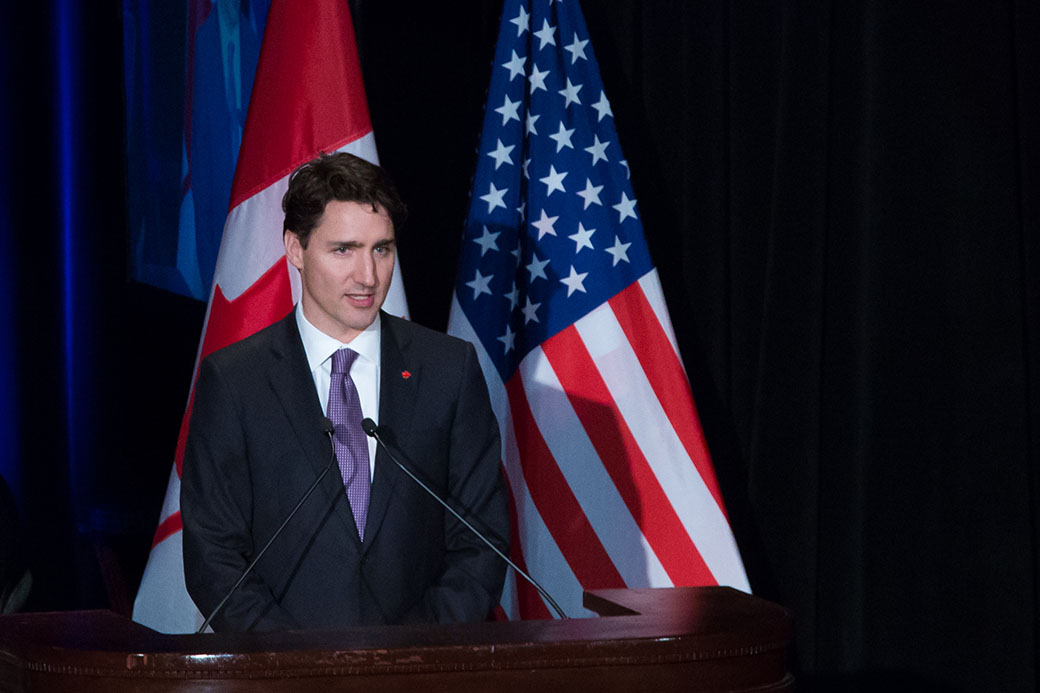U.S. president-elect Donald J. Trump has promised to renegotiate the North American Free Trade Agreement (NAFTA) in the early days of his administration. What will the Trudeau government’s position be going into these talks?
1. It believes NAFTA has benefited Canada but that the deal can be improved.
“NAFTA has been a success for Canada, the United States, and Mexico. Obviously any trade deal can be improved, and to the degree that the president-elect of the United States wants to see improvements to NAFTA, we’d be happy to sit down and talk,” said David MacNaughton, Canada’s ambassador to the United States.
There has been no acknowledgement that NAFTA has meant huge job losses in Canada and the United States, the displacement of Mexican farmers and growing income inequality in all three countries.
2. It believes that a win-win solution is possible. The Globe and Mail reported, “Finance Minister Bill Morneau struck a sunny tone Wednesday, saying he is confident of finding a ‘win-win’ solution on difficult trade issues, including softwood lumber and livestock, with Mr. Trump.”
The statement was made despite the likelihood that our food safety regulations could be weakened given our highly integrated markets and Trump’s claims about the Food and Drug Administration’s “inspection overkill” on soil use, farm and food production hygiene, food packaging and food temperatures.
3. It will put visa rules on the table. The Canadian Press reported, “Canada has been hoping for years to modernize NAFTA’s visa rules — considered out-of-date and cumbersome by companies that operate in both countries. NAFTA allows easy access to visas for a list of professions, but that list is more than two decades old and barely references jobs related to the digital economy.”
That said, Canada will lift its requirement on Dec. 1 for Mexicans visiting Canada to have a visa, but earlier this week Immigration Minister John McCallum said the Liberal government would reimpose the visa requirement if the number of refugee claims increases.
4. The Trudeau government said that the Canada-EU “free trade” talks show that they are skilled negotiators.
“As a government, our record on international trade is impeccable,” said David Lametti, parliamentary secretary to the Minister of International Trade. “We opened the beef markets in China and Mexico. We brought back CETA to its conclusion.”
Beef exports result in the massive virtual export of water, while more than 3.5 million Europeans have signed a petition against CETA given concerns about the power it gives to transnational corporations to sue elected governments and the food safety standards it weakens through regulatory harmonization.
5. The government believes that only tweaks are necessary. The Globe and Mail also reported, “The Trudeau government is trying to reassure Canadians that they shouldn’t fear demands to renegotiate NAFTA from a Donald Trump administration, arguing it would only amount to ‘tweaking’ or slight edits to the deal.”
There has been no suggestion that the Trudeau government will:
- Negotiate to remove the controversial Chapter 11 investor-state dispute settlement (ISDS) mechanism from NAFTA
- Seek to delete the energy proportionality provision, which has been described as a mandatory oil and gas export clause • Take action to protect water by removing it as a good, service and investment from the deal
- Hold any kind of public consultations on their negotiating position, nor a process that respects both the inherent and treaty rights of Indigenous peoples
- Conduct open and transparent negotiations so that people know what is being traded away to appease Trump.
It has also been reported that Trudeau spoke with Mexican President Enrique Pena Nieto following the U.S. presidential election and that the two governments — both of which see NAFTA as a beneficial “trade” agreement — have been working together and delivering similar public messages on NAFTA.
The Council of Canadians is opposed to NAFTA and stands in solidarity with American and Mexican allies who have highlighted the devastating impacts of this deal.
Please chip in to keep stories like these coming.
Image: PMO/Adam Scotti



